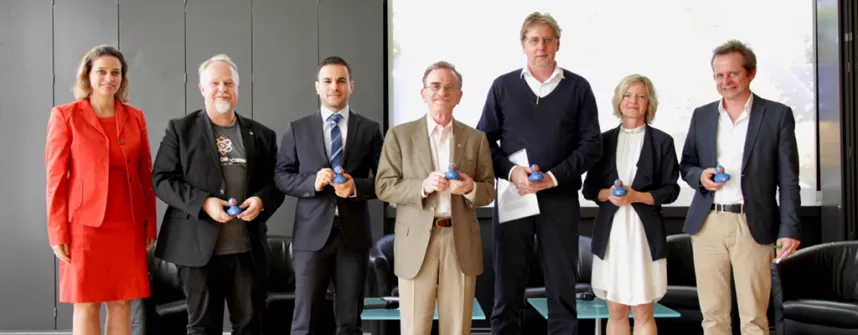Sharing scientific knowledge!
June 9, 2017
Nobel Prize winner Randy Schekman didn’t mince his words. He spoke of “deluxe journals” that should be boycotted, saying that key scientific results were often published in only a handful of journals in spite of digitization. At the same time, doubt was increasingly being cast on scientific findings in the area of, for example, climate research, he said. How can the world of science communicate its work more credibly and make it available to a wide audience? This was the topic of discussion among well-known scientists at Jacobs University on the eve of the 2017 graduation ceremony.
Print magazines select and only publish a handful of articles, argued Schekman, questioning the criteria based upon which this happens. These criteria often make no sense, with cases of bribery even having been documented, he said. This “exclusive club” that controls and limits the publication of scientific results needs to be combated, Schekman emphasized. The scientist, who was awarded the Nobel Prize for Medicine in 2013, is also editor in chief of the digital science journal eLife.
Prof. Gerard Meijer, director of the Fritz Haber Institute of the Max Planck Society for the Advancement of Science, likewise spoke out in favor of free access to scientific results, arguing that scientists had handed too much of publishing over to commercially driven publishing companies. Only 15 percent of scientific publications in the Netherlands were freely accessible, when it should actually be 100 percent, said Meijer.
“The system has to change,” stated Dr. Bernd Pulverer, chief editor of the EMBO Journal, for example with new forms of publishing being tried out. One individual who is already doing this is Jacobs alumni and social media expert Hashem Al-Ghaili, who held a mirror up to the scientists. “People aren’t interested in abstract results. What they want to know is: does this affect me? And they want authentic sources.” It is down to the world of science itself to generate publicity and win people’s trust, added Prof. Andrea Koschinsky-Fritsche of Jacobs University. “The transfer of knowledge is an important task.”
, Event with Nobel Prize winner Randy Schekman: Mind the gap ,Here is a summary of the event.
, More information: ,www.jacobs-university.de
About Jacobs University:
Jacobs University is a private, independent, English-language university in Bremen. Young people from all over the world study here in preparatory, Bachelor, Master, and PhD programs. Internationality and transdisciplinarity are special features of Jacobs University: research and teaching don’t just pursue a single approach, they address issues from the perspectives of multiple disciplines. This principle makes Jacobs graduates highly sought-after new talents who successfully strike out on international career paths.
Contact:
Thomas Joppig | Brand Management, Marketing & Communications
t.joppig [at] jacobs-university.de | Tel.: +49 421 200-4504
